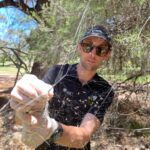A Perth researcher has received a prestigious Australian Research Council Future Fellow grant — one of only 200 fellowships awarded nationally — to unlock some of the scientific secrets of crime.
Working from the National Drug Research Institute (NDRI), Curtin University of Technology, Associate Professor Tony Butler will explore the causes of violent criminal behaviour and the health and drug related problems experienced by prison populations.
His work could bring major social and economic benefits for Australia, potentially helping to stop people committing criminal acts or re-offending and reducing the costs of imprisonment.
The research could also be used to help treat health problems in prisons, reduce the transmission of disease when prisoners are released, helping to ease the burden on the health system and keeping the community healthier.
Associate Professor Butler’s ground-breaking research will also focus on the links between impulsive behaviour and criminal activity and drug use.
“Impulsivity has been linked to reduced levels of a brain neurotransmitter called serotonin,” he said.
“This is potentially treatable using a class of anti-depressants called selective serotonin re-uptake inhibitors.”
A recent pilot study undertaken with violent re-offenders by Associate Professor Butler showed reductions in impulsivity, irritability, anger, and assaultive behaviour when they were provided with this anti-depressant.
“Based on these results, a larger study based is warranted, we would expect that by increasing serotonin activity within the brain, we could reduce impulsive aggressive behaviour in many violent offenders,” he said.
“What this means is that by using this medication in a monitored way, we may be able to show that, in certain cases, impulsive and sometimes dangerous behaviour can be reduced.”
Associate Professor Butler’s program of Future Fellowship research includes studies of:
• possible relationship between head injuries and subsequent criminal behaviour;
• health and drug related problems suffered by Indigenous prisoner populations; and
• blood-borne virus infections among Australian prisoners.
“These are all areas where science can help us find out why people offend, and help stop them re-offending,” Associate Professor Butler said.
“Our findings can reduce the huge amounts of money spent on imprisoning offenders by stopping some of them from offending in the first place.”
“We will also be able to deal with the health problems that arise from large prison populations.”
The Australian Research Council Future Fellowship Scheme is designed to provide the best and brightest in Australian research with the resources needed to conduct four years of world-class research.


